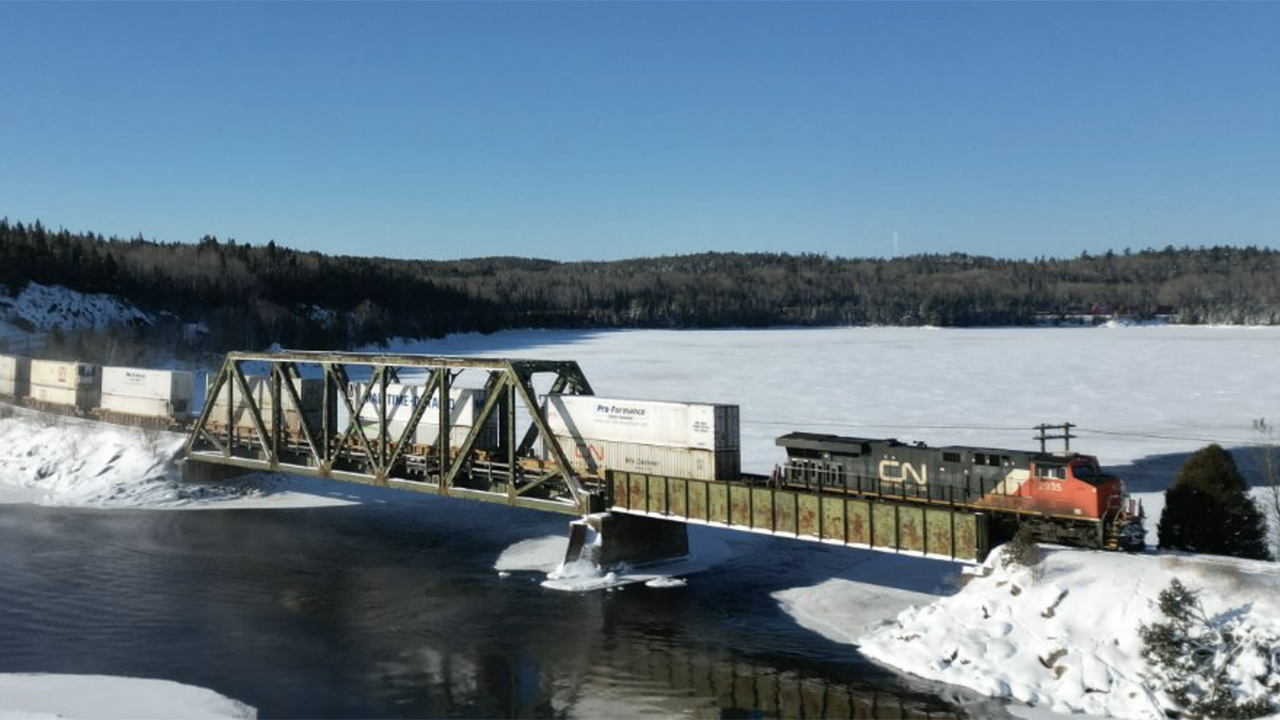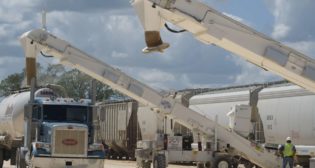
CN, CPKC File Notices of Dispute in Negotiations With TCRC
Written by Marybeth Luczak, Executive Editor
(CN Photograph)
CN and Canadian Pacific Kansas City (CPKC) on Feb. 16 filed separate Notices of Dispute in their negotiations with the Teamsters Canada Rail Conference (TCRC). The notices ask the Federal Mediation and Conciliation Service to appoint a government mediator to help them reach negotiated collective agreements, the Class I’s reported. The union—which on the same day said the move “has taken us by surprise”—reported Feb. 19 that the railroads “are not serious about negotiating and avoiding a work stoppage” and “aim to eliminate all safety-critical rest provisions from our collective agreements.”
TCRC represents approximately 6,000 conductors, conductor trainees, yard coordinators and locomotive engineers across CN’s network in Canada; and roughly 3,200 locomotive engineers, conductors, and train and yard workers at CPKC in Canada. Also under negotiation at CPKC is a contract with the TCRC-Rail Canada Traffic Controllers (RCTC) division, which represents about 80 of the railroad’s rail traffic controllers in Canada.
While the three TCRC collective agreements expired Dec. 31, 2023, they will remain in effect under Canadian labor law until the parties reach agreements. Once a Notice of Dispute is filed, a Federal Conciliation Officer must be appointed within 15 days (see collective agreement bargaining process chart below). The Notice also starts the legal process toward a possible strike or lockout. Under the Canada Labor Code, a work stoppage could occur as soon as 81 days after a government mediator is appointed, which in these cases could potentially lead to a dispute as early as May.

“CN continues its efforts to modernize its railway in a manner that will deliver the best possible service to our customers, while providing our employees with better work conditions and better work/life balance,” CN Executive Vice President and Chief Network Operating Officer Pat Whitehead said on Feb. 16. “Recent regulatory changes have challenged crew availability and CN is proposing to address that issue through a modernization of the compensation model. A strong supply chain is good for all stakeholders, the economy, and our employees.”
The railroad said it “strongly believes that an agreement can be achieved through the collective bargaining process and remains committed to working with the TCRC to reach an agreement that is good for the employees, for CN and for Canada’s supply chain.”
According to CPKC, “good faith” negotiations with TCRC-Train & Engine (T&E) and TCRC-RCTC have been ongoing since September 2023. “CPKC has offered both a fair and balanced agreement with wage and benefit increases and more schedule predictability and quality of life improvements for its T&E employees,” it reported Feb. 16. The latest collective bargaining negotiation session took place the week of Jan. 29, 2024, CPKC said, noting that both the Class I and union leadership “remain far apart on the issues.”
“CPKC is and will remain focused on, and committed to, arriving at a negotiated outcome that is in the best interests of its employees and their families, its customers, its shareholders and the overall Canadian economy,” the railroad reported. While CPKC added that it has “an excellent track record of successful collective bargaining with its unions,” Federal Conciliation has been required in nine of the 10 collective bargaining rounds of negotiations between the TCRC-T&E and CPKC since 1993.
TCRC Speaks Out
“CN and CPKC aim to eliminate all safety-critical rest provisions from our collective agreements,” Teamsters Canada National President François Laporte reported on Feb. 19. “These provisions are necessary to combat crew fatigue and ensure public safety. We want to reach a negotiated settlement, but their demands are non-starters for the Teamsters. Safety is non-negotiable.” The union also released a letter to members (download below).
According to Teamsters Canada, the “current collective agreements provide rest provisions that work in conjunction with the existing regulatory framework, allowing workers to better manage their fatigue.”
Fatigue Management
The issue of fatigue management in freight train operations has been on the Transportation Safety Board of Canada’s “Watchlist” since 2016 and was expanded in 2018 to include air and marine operations. Transport Canada in 2020 updated the Duty and Rest Period Rules for Railway Operating Employees, placing new limits on duty-period length; increasing the minimum rest period between shifts; and establishing limits on total hours worked per week, month and year. The rules, which were set in 2002 and revised in 2011 to include fatigue management, were updated with input from railroads and labor organizations. In May 2023, the rules took effect for freight rail workers, capping their “maximum shift length at 12 hours, down from 16,” according a Feb. 19 report by The Canadian Press. “They also raised the minimum rest period between shifts to 10 hours at home and 12 hours when away from home, versus the previous six hours and eight hours, respectively.”
According to the Canadian national news agency, “[t]he current collective agreements go beyond what regulations require for rest, Teamsters Canada spokesman Christopher Monette said. For example, engineers … and conductors who oversee schedules and communication can limit their shift to 10 hours rather than the 12-hour ceiling stipulated under federal rules.” Monette told the The Canadian Press in an interview: “We plug holes in the regulations that we believe exist and we seek to to [sic] improve them to the benefit of our members and to the benefit of the public.” Teamsters Canada “is hoping for ‘incremental’ gains on existing rest provisions, he added,” the news agency reported.
CN spokesman Jonathan Abecassis said in an email to The Canadian Press that his railroad’s “offer, which was refused by the union, guaranteed predictable schedules and consecutive days off for employees to specifically address work-rest balance, while keeping supply chains fluid.” The proposal, the news agency said, “would see employees on a scheduled 40-hour work week, with at least 10 or 12 hours of rest between shifts—depending on whether they’re at home or away—and either two or three consecutive days off each week, in compliance with federal rules.” According to The Canadian Press, “Abecassis said the union’s demands would place stress on supply chains and more costs on consumers.”

CPKC on Feb. 19 reported that the TCRC-T&E “has chosen to grossly misrepresent the facts regarding our ongoing collective bargaining and the multiple proposals made by CPKC.” The railroad said it has offered two options for renewed contracts that will “provide benefits for all:
- “The first delivers significant pay increases and improved work-life balance with scheduled, predictable days off through a dramatically simplified system. The offer presents a progressive, modern time-based pay model that delivers improved benefits for employees.
- “With the exception of our proposal amending the held away from home provision for train crews, the second option offers competitive wage increases that are consistent with recent settlements and maintains the status quo for work rules within the new Transport Canada regulatory framework for rest.”
CPKC said that “neither of these proposals, or anything CPKC has put forward, creates any risk to safety or employee well-being.” It pointed out that if “redundant and archaic work rules are dissolved, employees would benefit from a modern agreement that enables higher wages and predictable, scheduled time off, while fully complying with new regulatory requirements for rest.” The railroad added that the TCRC bargaining team “has not put forward any comprehensive offers of their own.”
CPKC concluded that it “remains focused and committed to arriving at a negotiated outcome that is in the best interests of our railroaders and their families” and is “doing everything we can to avoid a work stoppage.”
TD Cowen Insight
TD Cowen, a division of TD Securities, issued a “Flash Note” on Feb. 20 regarding the labor talks.
The impact of the respective Notices of Dispute is “slightly negative for CN and CPKC,” according to the TD Cowen note. “It will be several months before a work stoppage could occur at either company, and the Canadian government has a history of intervening fairly quickly with back-to-work legislation; so investors tend to look through the one-time earnings impacts. However, we see the potential for future labour disruption as at least slightly negative for near-term investor sentiment. Furthermore, strikes are disruptive to customers, which can have a lingering impact on market share, as we saw at the Ports of Vancouver/Prince Rupert following the dockworkers’ strike last July (a 13-day outage). Unlike the U.S., where the railroads bargain collectively, the TCRC has separate contracts with CN and CPKC, and it is just a coincidence that both expired on December 31, 2023.
”CN and CPKC have gotten to the point of seeking conciliation, but the sides seem further apart in the CPKC-TCRC talks. CPKC commented in its press release, ‘Both CPKC and Union leadership remain far apart on the issues.’ CN made no similar comment in its press release, and expressed the belief that a negotiated agreement was still possible.
”The Federal Minister of Labour has 15 days to appoint a conciliator, once conciliation has been requested. The mediation period extends for 60 days following the appointment of a conciliator, unless there is mutual agreement by the parties to request an extension. Following termination of conciliation, the parties go into a 21-day cooling-off period, during which the Federal Minister of Labour can appoint a mediator to continue assisting the talks. The cooling-off period has to expire before either side, at CN-TCRC or CPKC-TCRC, can initiate a work stoppage, and that is subject to a 72-hour notice period, which points to May/June.
”We understand that the key issues relate to wage/benefit increases and scheduling/work-life balance.”
![“This record growth [in fiscal year 2024’s third quarter] is a direct result of our innovative logistic solutions during supply chain disruptions as shippers focus on diversifying their trade lanes,” Port NOLA President and CEO and New Orleans Public Belt (NOPB) CEO Brandy D. Christian said during a May 2 announcement (Port NOLA Photograph)](https://www.railwayage.com/wp-content/uploads/2024/05/portnola-315x168.png)


